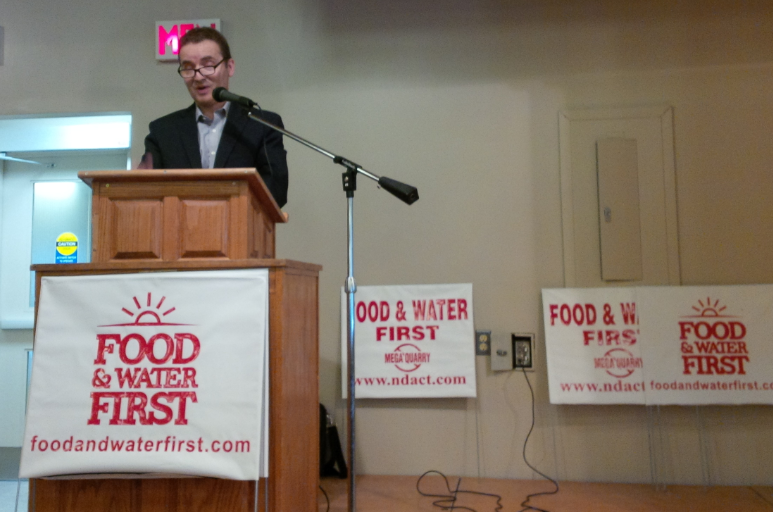Ontario’s prime farmland most productive in world

From MegaQuarry News
We don’t normally send you an update at the start of the week, but the Public Meeting deserves a special bulletin! Despite a spring snowstorm that shut down local roads, about 200 people packed into the Centre Dufferin Recreation Complex in Shelburne to learn more about Ontario’s rare farmland, our vital agri-food sector and the land once owned by the Highland Companies.
Our guest speakers gave thorough presentations and answered excellent questions. We thank them!
The highlights:
Professor Van Acker spoke eloquently about the rare soil we rely on to grow our food. “Food is of the land, we are the food we eat, therefore we are of the land.” He also pointed out that because of our regular rainfall, Ontario’s prime farmland is more productive and valuable than in other parts of the world. “Studies from across the globe show us that high-income countries have generally more land suitable for rain-fed agriculture, and that arable rain-fed farmland per person is also highest in developed and middle income countries.” Professor Van Acker told the audience that defending our farmland “is not only noble, but fundamentally necessary.”
Click value-of-farmland for Rene Van Acker’s presentation.
Steve Peters, a former Agriculture Minister and Speaker of the Ontario Legislature outlined the size and importance of the province’s food processing sector. Ontario processes 40 per cent of the food processed in Canada. He explained that this province has a great reputation for its food and water resources. “We’re not just feeding ourselves, we’re feeding the world.” But Steve Peters also warned that we must become more conscious of where our food comes from, that we have the “opportunity to better support local food producers” and should not rely on cheaper imports.
The final speaker, Tom Eisenhauer, described what Bonnefield has done with the 6,500-acres of farmland it purchased from Highland last summer. Six farmers are leasing the bulk of the land; some houses and smaller acreages have been sold; some homes are being rebuilt; all of the farmers and investors in Bonnefield are Canadian.
Tom Eisenhauer also told the meeting that his investors “are not looking for mining” opportunities and not interested in wind turbines. He said while Bonnefield can’t guarantee the land will be farmed forever, he said the best way to keep it in food production is to “keep farmers profitable.” He stressed that “farming should be discussed as economic policy, not social policy.”
Thanks to broadcaster Dale Goldhawk for being our stellar MC. It was great seeing many of our Partners at the meeting — Land Over Landings, Save Midhurst, Ontario Farmland Trust, Ontario Farmland Preservation, Escarpment Biosphere Conservancy and the Simcoe Federation of Agriculture. (Hope we didn’t miss anyone!)
A special thanks to our many volunteers for making Saturday’s meeting a success and to all of you for braving the elements to attend!
Have a great week!
The Food & Water First Team









Leave a Reply